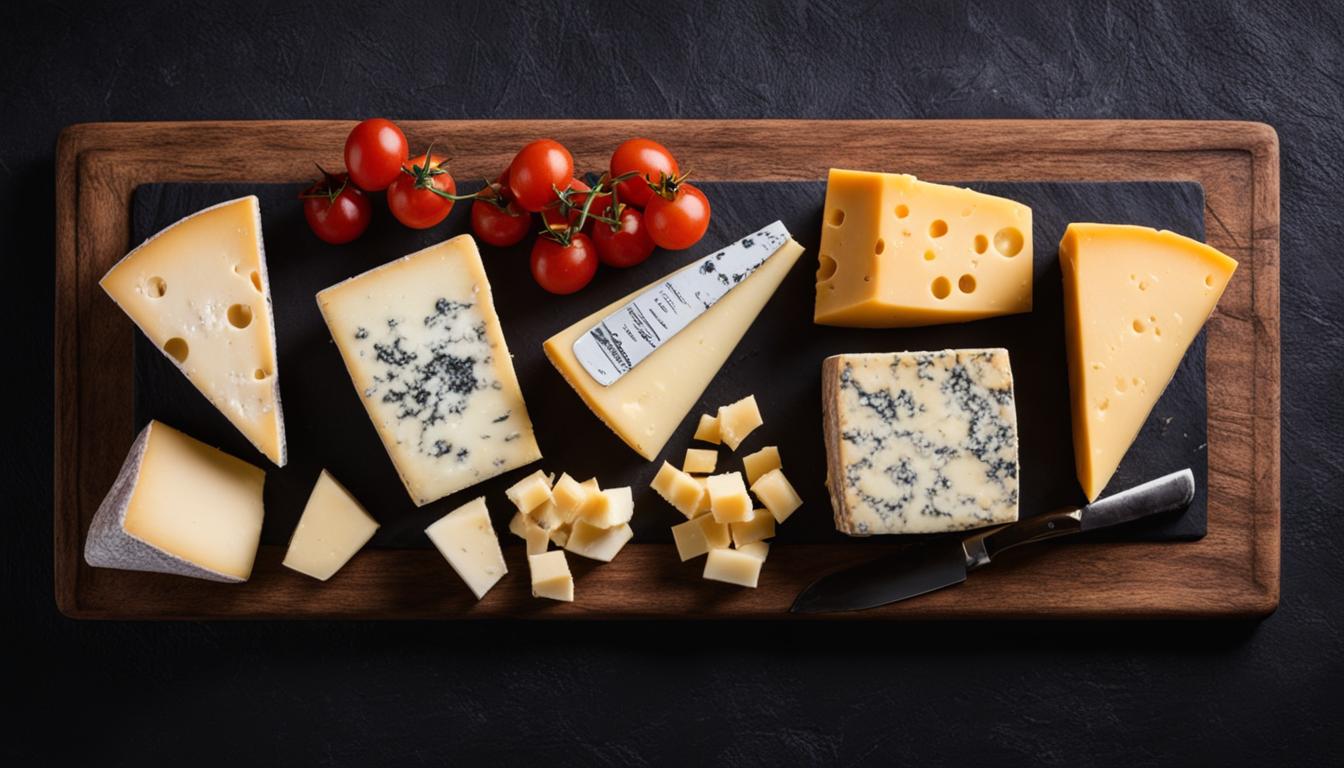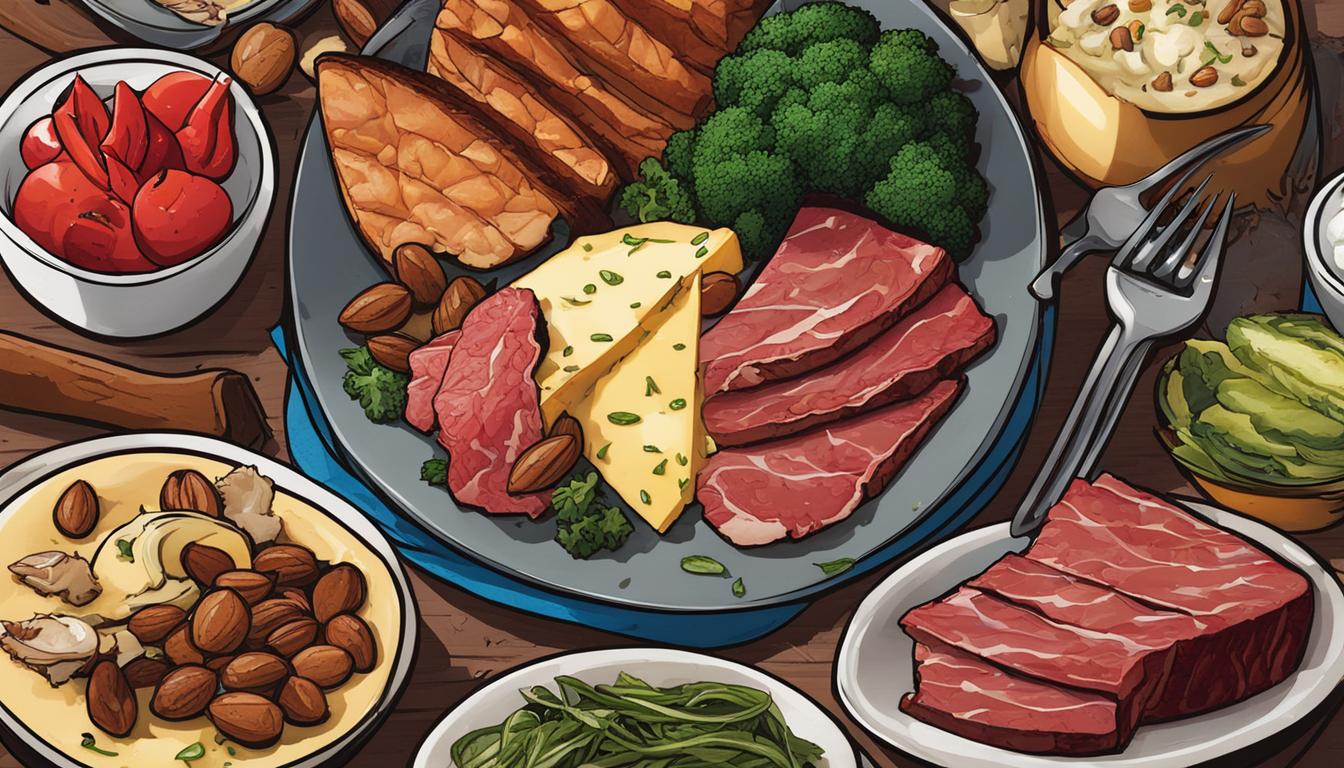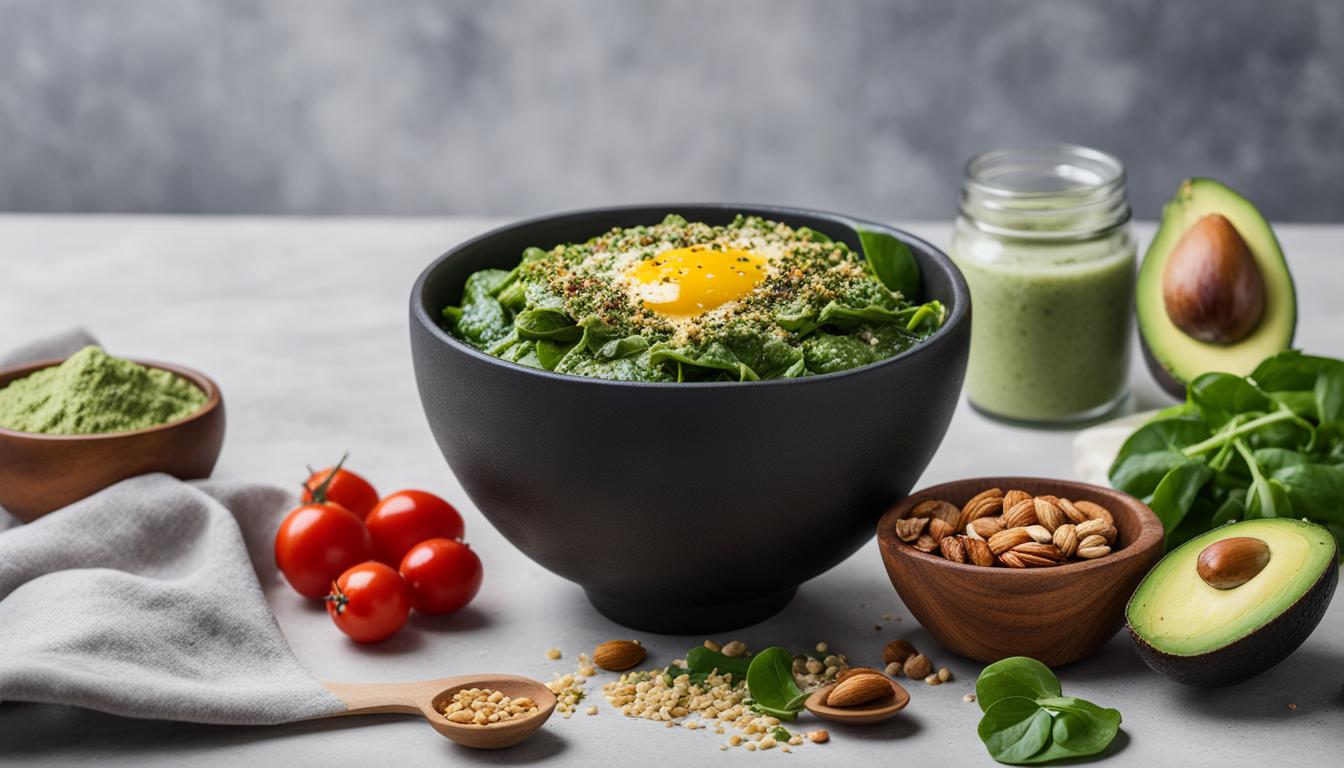Cheese is a beloved food enjoyed by many. It tantalizes our taste buds with its creamy texture and rich flavors. But if you’re following a low-carb or keto diet, you might be wondering: is cheese low in carbohydrates? Let’s delve into the world of cheese and explore its carb content.
Cheese is made from aged milk, enzymes, and microbial strains, resulting in a wide array of cheese varieties. From the mild tanginess of cheddar to the luxurious creaminess of brie, cheese offers something for every palate. But what about its carbohydrate content? Are there carbs hiding in that slice of gouda or mound of mozzarella?
The good news is that most cheeses are indeed low in carbohydrates. This makes them a suitable choice for those following a low-carb or keto diet. However, it’s essential to approach cheese consumption with moderation, as it is calorie-dense due to its high fat content. Keep reading to discover how to make the most of cheese while keeping an eye on your carbohydrate intake.
Key Takeaways:
- Cheese is generally low in carbohydrates, making it suitable for a low-carb or keto diet.
- Most cheeses contain 1-2 grams of carbs per ounce, allowing for moderate consumption while staying within carb limits.
- Flavored cream cheese and cheeses with added fruit may contain more carbs and should be avoided or consumed in moderation.
- It’s important to check labels on cheese-flavored products like crackers, dips, and soups, as they can vary in their carb content.
- Despite its fat and protein content, excessive consumption of cheese can hinder weight loss and cause digestive issues in some individuals.
Most Cheeses are Keto-Friendly
Cheese is a delicious and versatile food that can be enjoyed on a keto diet. It is naturally high in fat and low in carbs, making it a popular choice for those following a ketogenic lifestyle. Most cheeses contain only 1-2 grams of carbs per ounce, which allows for moderate consumption while still staying within carb limits.
Whether you prefer Cheddar, Swiss, or Mozzarella, you can find a keto-friendly cheese that suits your taste. Cheese can be enjoyed as a savory snack on its own or used to add flavor, fat, and protein to keto-friendly meals.
One creative way to include cheese in your keto diet is by making chaffles. Chaffles are waffles made with cheese and eggs, providing a satisfying and delicious low-carb alternative to traditional waffles. Cheese can also be melted on top of meats and vegetables or used as a filling in omelets and frittatas.
However, it’s important to note that not all cheeses are equally suitable for a keto diet. Flavored cream cheese and cheeses with added fruit or sweeteners should be avoided, as they may contain additional carbs. Additionally, some plant-based cheeses may have higher carb content, so it’s always a good idea to check the labels before adding them to your keto menu.
Overall, most cheeses are keto-friendly and can be enjoyed as part of a well-balanced ketogenic diet. With their delicious flavors and versatility, cheese can be an excellent addition to your keto meal plan.
| Cheese Variety | Carbs per 1 oz |
|---|---|
| Cheddar | 0.4g |
| Swiss | 1g |
| Mozzarella | 1.1g |
| Monterey Jack | 0.1g |
Cheese Varieties That Fit a Keto Diet
When it comes to following a keto diet, there are plenty of cheese options that are both delicious and low in carbs. Here are some of the best cheese varieties for keto:
1. Cheddar Cheese
Cheddar cheese is a classic choice for keto followers. It is rich in flavor and has minimal carbs, making it a versatile option for snacking or incorporating into keto-friendly recipes.
2. Mozzarella Cheese
Mozzarella cheese is not only a popular pizza topping but also a keto-friendly option. Its mild flavor and smooth texture make it a versatile cheese that can be used in various dishes.
3. Swiss Cheese
With its nutty and slightly sweet flavor, Swiss cheese adds a delicious twist to keto meals. It pairs well with low-carb deli meats and is a great option for sandwiches or cheese boards.
4. Brie Cheese
Brie cheese is a creamy and soft cheese that is loved by many. It has a high fat content and very few carbs, making it an ideal choice for keto followers looking to add some decadence to their meals.
5. Gouda Cheese
Gouda cheese is a Dutch cheese known for its slightly smoky and nutty flavor. It is a keto-friendly option that can be enjoyed as a snack or melted in various recipes.

Incorporating these cheese varieties into your keto diet can add flavor and richness to your meals while keeping your carb intake low. Remember to enjoy them in moderation, as cheese can still be calorie-dense. Pair them with low-carb fruits, nuts, or vegetables to create a well-rounded and satisfying keto-friendly meal.
Enjoying Cheese on Keto
While many types of cheese are keto-friendly, it’s important to consume them in moderation. Cheese is high in calories due to its fat content, so overeating can hinder weight loss. Additionally, nearly 70% of the population is lactose intolerant to some degree, so it’s important to be mindful of any digestive issues when consuming cheese. To enjoy cheese on a keto diet, it’s recommended to stick to reasonable portion sizes and choose high-quality options. Checking carb counts and ingredient lists is crucial to ensure the cheese fits within your macro and food quality preferences.
“Moderation is key when it comes to enjoying cheese on a keto diet. It’s not about eliminating it entirely, but rather making informed choices and being mindful of portion sizes.” – Dr. Katherine Johnson, Nutritionist
Tips for Enjoying Cheese on a Keto Diet
- Stick to moderate portion sizes: Enjoy cheese as part of a well-balanced meal or snack, paying attention to portion sizes to avoid excessive calorie intake.
- Choose high-quality cheese: Opt for natural cheeses without added fillers or sweeteners to ensure you’re getting the most nutritious and keto-friendly option available.
- Check carb counts: Different cheese varieties may have varying amounts of carbohydrates, so it’s essential to check the nutrition labels and choose options that fit within your carb limits.
- Be mindful of lactose intolerance: If you experience digestive issues after consuming cheese, you may be lactose intolerant to some degree. Consider alternatives or limit your intake to avoid discomfort.
- Experiment with different cheese varieties: Explore the wide range of keto-friendly cheeses available, such as goat cheese, blue cheese, cream cheese, and parmesan cheese, to add variety to your diet.
Benefits of Enjoying Cheese on a Keto Diet
Despite the need for moderation, incorporating cheese into your keto diet can offer numerous benefits:
- High fat content: Cheese is naturally high in fat, making it a valuable source of energy and helping you feel satisfied and full.
- Protein-rich: Cheese is also a great source of protein, which is essential for muscle repair and growth.
- Calcium and other nutrients: Cheese is rich in essential nutrients like calcium, vitamin B12, and phosphorus, which are important for overall health.
By practicing portion control and choosing high-quality options, you can enjoy cheese while staying on track with your keto diet.
Cheese to Avoid on Keto
While most cheeses can be enjoyed on a keto diet, there are a few varieties that you should either avoid or consume in moderation. Some cheeses may have higher carbohydrate content or ingredients that are not suitable for a keto lifestyle. Here are a few examples:
- Cream Cheese: Although cream cheese is a popular choice for many keto recipes, it’s important to check the label. Flavored cream cheese varieties may contain added sugars or other high-carb ingredients. Stick to plain, unsweetened cream cheese to keep it keto-friendly.
- Blue Cheese: Blue cheese is generally low in carbs and can be enjoyed in moderation on a keto diet. However, it’s best to check the label as some varieties may be mixed with higher carb ingredients like fruits or honey.
- Feta Cheese: Feta cheese is lower in carbs compared to some other types of cheese, but it’s still important to be mindful of portion sizes. Some feta cheese varieties may have added seasonings or marinades that can increase the carb content.
When choosing cheese for your keto diet, always read the labels and check for any added sugars, fruits, or fillers that may increase the carb content. Stick to high-quality, natural cheeses with minimal ingredients to ensure they align with your keto goals. Remember, moderation is key when it comes to enjoying cheese on a keto diet.
“When choosing cheese for your keto diet, always read the labels and check for any added sugars, fruits, or fillers that may increase the carb content. Stick to high-quality, natural cheeses with minimal ingredients to ensure they align with your keto goals. Remember, moderation is key when it comes to enjoying cheese on a keto diet.”
Cheese-Based Products and Keto
Cheese is not only enjoyed on its own but also used as a key ingredient in a variety of cheese-based products. Whether you’re looking for a snack or a flavorful addition to your keto-friendly meals, there are several options available. Here are some examples of cheese-based products and their suitability for a keto diet:
Cheese Crackers
Cheese crackers are a popular choice for those seeking a crunchy and savory snack. Made primarily with cheese, these crackers are generally low in carbohydrates, making them a suitable option for those following a keto diet. They provide a satisfying crunch and can be enjoyed on their own or paired with keto-friendly dips.
Cheese Dips and Sauces
Cheese dips and sauces can add a burst of flavor to your meals and snacks. Whether you’re looking for a creamy dip for your veggies or a tangy sauce for your meat, there are many cheese-based options that are keto-friendly. These dips and sauces are typically made with a blend of cheeses and other keto-friendly ingredients, providing a delicious and satisfying addition to your dishes.
Cheese-Based Soups
Cheese-based soups are a comforting and flavorful option for those following a keto diet. These soups are typically rich, creamy, and packed with cheese, making them a satisfying meal choice. From broccoli and cheddar soup to loaded cauliflower soup, there are numerous cheese-based soup recipes that are both delicious and suitable for a keto lifestyle.
Blue Cheese Salad Dressing
If you’re a fan of tangy and creamy salad dressings, blue cheese salad dressing is a keto-friendly option. Made with blue cheese, mayonnaise, and other flavorful ingredients, this dressing adds a burst of flavor to your salads without a high carb content. It’s perfect for those looking to enhance the taste of their greens while sticking to their keto goals.
Cheesecake
No keto dessert list is complete without mentioning cheesecake. Made with cream cheese, eggs, and a keto-friendly sweetener, cheesecake allows you to indulge in a creamy and decadent treat without the guilt. There are various low-carb cheesecake recipes available, ensuring that you can satisfy your sweet tooth while staying in ketosis.
Mozzarella Sticks
Mozzarella sticks are a popular appetizer that can also be enjoyed as a keto-friendly snack. These sticks are typically coated in a mixture of cheese, eggs, and low-carb breading, providing a crispy exterior and a gooey, melted cheese center. They are a delicious option for those craving a cheesy and satisfying snack on a keto diet.
As you can see, there is a wide range of cheese-based products that can be enjoyed on a keto diet. From cheese crackers and dips to cheese-based soups and desserts, these options allow you to incorporate your love for cheese into your keto lifestyle while still staying within your carb limits.
Other Keto-Friendly Cheese Varieties
In addition to the previously mentioned cheeses, there are other varieties that are keto-friendly:
Goat Cheese
Goat cheese is a tangy and creamy cheese with a distinct flavor. It is lower in fat and calories compared to cow’s milk cheese, making it a good option for those watching their calorie intake on a keto diet. Goat cheese is also rich in essential nutrients like calcium and vitamin A.
Blue Cheese
Blue cheese is known for its strong and pungent flavor. It is a great choice for adding a burst of flavor to salads or burgers. Blue cheese is low in carbs and high in fat, making it suitable for a keto diet. It is also a good source of calcium and vitamin K.
Cream Cheese
Cream cheese is a smooth and spreadable cheese that is commonly used in both savory and sweet dishes. It is low in carbs and high in fat, making it a staple in many keto recipes. Cream cheese is versatile and can be used as a base for dips, sauces, and desserts.
Parmesan Cheese
Parmesan cheese is a hard and flavorful cheese that is often grated on top of pasta dishes. It is low in carbs and high in protein, making it a suitable option for a keto diet. Parmesan cheese is also a good source of calcium and phosphorus.
Cheese Crisps
Cheese crisps, also known as cheese chips or cheese crackers, are a crunchy and crispy snack made from melted cheese. They are a delicious and keto-friendly alternative to traditional carb-filled chips and crackers. Cheese crisps are typically made from varieties like cheddar, parmesan, or mozzarella.

Enjoying these keto-friendly cheese varieties can add variety and flavor to your meals while keeping your carb intake in check.
Cheeses to Avoid on Keto
While many cheeses are suitable for a keto diet, there are some varieties that should be avoided or limited:
- Canned Cheese: Canned cheese often contains added fillers and preservatives that may increase carb content. It’s best to opt for fresh cheese options.
- Spray Cheese: Spray cheese typically contains additives and artificial ingredients that can hinder a keto diet. It’s better to choose natural cheese options.
- American Cheese: American cheese, often processed and with higher carb content, may not be the best choice for a keto diet. Opt for natural cheese varieties instead.
- Mild Cheddar Cheese: Mild cheddar cheese may contain more lactose and therefore more carbs compared to sharper cheddar varieties. Enjoy sharp cheddar in moderation on a keto diet.
- Ricotta Cheese: Ricotta cheese, while delicious, can have a higher carb content. Use it sparingly or try other keto-friendly cheese varieties.
- Cottage Cheese: Cottage cheese can vary in carb content, so it’s important to check labels. Some brands or flavored options may contain additives that add to the carb count.
If you’re following a keto diet, it’s essential to be mindful of the carb content in different cheese varieties. Opt for natural, high-quality options and check labels for additional ingredients that may increase carb count. Moderation is key when enjoying cheese on a keto diet.
Making Keto-Friendly Cheese Choices
When following a keto diet, it’s essential to make informed choices when it comes to selecting cheeses. Consider the quality of the cheese you choose, aiming for high-quality options that are natural and free from added fillers or sweeteners.
To ensure the cheese fits within your desired macros, it’s important to check the carb counts and ingredient lists. Most cheeses are naturally low in carbs, but there may be variations among different brands and varieties. By checking the carb counts, you can make sure the cheese aligns with your dietary goals.
While cheese is a keto-friendly food, it’s important to exercise portion control due to its high calorie content. Even though it’s low in carbs, consuming excessive amounts of cheese can hinder weight loss. Therefore, it’s recommended to enjoy cheese in moderate portions to maintain a balance.
For individuals who may have lactose intolerance or experience digestive issues, it’s advisable to be mindful of any discomfort that may arise from consuming cheese. Listening to your body and adjusting your cheese consumption accordingly can help ensure a comfortable and enjoyable keto experience.
When making keto-friendly cheese choices, consider the following:
- Choose high-quality, natural cheeses without added fillers or sweeteners.
- Check carb counts and ingredient lists to ensure the cheese aligns with your desired macros.
- Practice portion control due to the high calorie content of cheese.
- Be mindful of lactose intolerance or any digestive issues that may arise from consuming cheese.
Keto-Friendly Cheese Choices Table
| Cheese Variety | Carb Content per 1 oz (approx.) |
|---|---|
| Cheddar Cheese | 0.4g |
| Swiss Cheese | 1g |
| Monterey Jack Cheese | 0.1g |
| Brie Cheese | 0.1g |
| Gouda Cheese | 0.6g |
These are just a few examples of keto-friendly cheese choices. Remember, the carb content may vary slightly between brands and specific varieties of cheese, so checking labels is always recommended.
By making keto-friendly cheese choices, considering the quality, carb counts, portion control, and individual dietary needs, you can incorporate cheese into your keto lifestyle while staying on track with your health and weight goals.
Conclusion
Cheese is a suitable option for those following a low-carb or keto diet, as it is generally low in carbohydrates. Most cheeses contain only 1-2 grams of carbs per ounce, allowing for moderate consumption while staying within carb limits. However, it is important to choose high-quality cheeses that are free from added fillers or sweeteners. Certain varieties of cheese, such as flavored cream cheese and those with added fruit, should be avoided or consumed in moderation to maintain a low-carb intake.
When incorporating cheese into a keto diet, it is essential to be mindful of cheese-based products, as their carb content can vary. Checking labels and reviewing nutritional information is necessary to make informed choices. Additionally, portion control plays a vital role in managing calorie intake, as cheese is high in calories due to its fat content.
To fully enjoy the benefits of cheese on a low-carb or keto diet, it is recommended to opt for natural and high-quality cheeses. These choices will ensure that you receive the desired nutritional benefits without compromising your dietary goals. By making informed decisions, being mindful of portion sizes, and choosing suitable cheese options, you can effectively incorporate cheese into a low-carb or keto diet while enjoying its delicious flavors and textures.
FAQ
Is cheese low in carbohydrates?
Yes, most cheeses are low in carbohydrates, making them suitable for a low-carb or keto diet. However, it’s important to choose high-quality cheeses without added fillers or sweeteners.
Are most cheeses keto-friendly?
Yes, most cheeses are keto-friendly due to their low carb content. They can be enjoyed as a snack or incorporated into keto-friendly meals to add fat and protein.
What are some examples of cheese varieties that fit a keto diet?
Some examples of cheese varieties that fit a keto diet include cheddar, mozzarella, Swiss, feta, and cream cheese.
Can you eat cheese on a keto diet?
Yes, cheese can be eaten on a keto diet. However, it should be consumed in moderation due to its high calorie content. Portion control is key.
What cheeses should be avoided on a keto diet?
Flavored cream cheese and cheeses with added fruit should be avoided or consumed in moderation on a keto diet. Blue cheese and feta cheese are also higher in carbs and should be limited.
Are cheese-based products keto-friendly?
Cheese-based products can vary in their carb content, so it’s important to check labels. Generally, cheese crackers, cheese dips and sauces, cheese-based soups, blue cheese salad dressing, and cheesecake can fit into a keto diet when made with low-carb ingredients.
What are some other keto-friendly cheese varieties?
Other keto-friendly cheese varieties include goat cheese, blue cheese, cream cheese, parmesan cheese, and cheese crisps.
What cheeses should be avoided on a keto diet?
Canned cheese, spray cheese, American cheese, mild cheddar cheese, ricotta cheese, and cottage cheese should be avoided on a keto diet as they have higher carb contents.
How can I make keto-friendly cheese choices?
To make keto-friendly cheese choices, opt for high-quality cheeses without added fillers or sweeteners. Check carb counts and portion sizes to ensure they fit within your desired macros.
Is cheese low in carbohydrates? Conclusion
Yes, most cheeses are low in carbohydrates, making them a suitable option for those following a low-carb or keto diet. However, it’s important to choose high-quality cheeses without added fillers or sweeteners and consume them in moderation.


